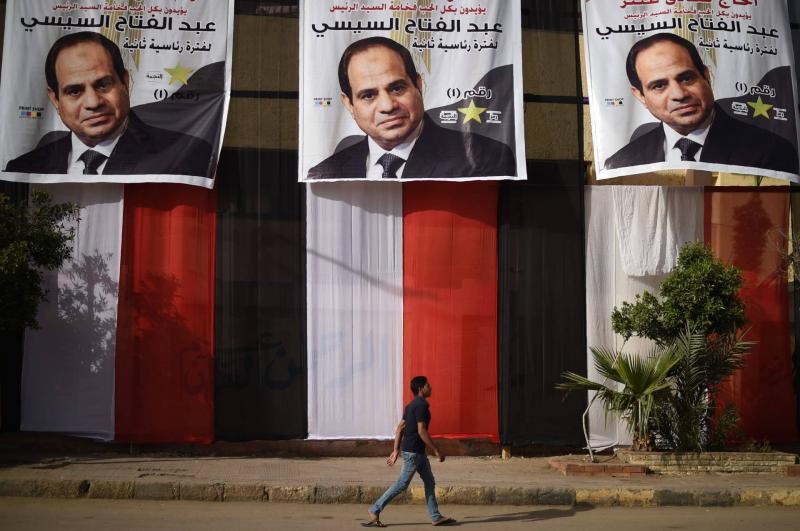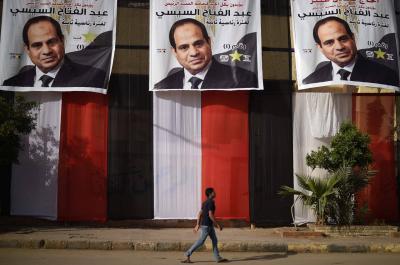On the fourth and top floor of the building number 7 on the alley of "Al-Barqouqiya" from "Al-Kharnafish" street located along Al-Muizz Li-Din Allah Al-Fatimi street in the historic "Al-Gamaliya" district south of Cairo, Abdel Fattah Sisi was born, raised, and lived with his parents and siblings for part of his childhood. He resided in a property owned by his grandfather, Hussein Sisi, where relatives still inhabit the house after Abdel Fattah left the neighborhood. On the morning of November 19, 1954, the cries of a newborn echoed, and neither his family nor extended relatives from the Monufia governorate, north of Cairo, could foresee that fate would write significant lines in modern Egyptian history under his name—that he would become the army leader who protected his country from falling into the clutches of terrorism and religious fascism, and eventually, he would likely become the fifth president of Egypt and the new resident in the presidential palace in Heliopolis.
The alley, as reported by the "Al-Ahram" newspaper, is located in the midst of an open museum of Islamic artifacts in Fatimid Cairo, and just a few meters from the Sisi family residence is building number 3 on Khamees Al-Adsi alley, where the late leader President Gamal Abdel Nasser lived for three years during his primary school phase in 1925 while staying with his uncle Khalil Hussein.
**His Upbringing and Life in Al-Gamaliya**
Sisi grew up in a well-off family, as his father, Said Sisi, worked in the trade of mother-of-pearl and arabesque, owning around ten shops in Khan El-Khalili. Al-Bakri Primary School on 44 Sikka Burjwan street was where he started school, and it marked the beginning of his classmates getting to know him closely. Some of his schoolmates from that period noted that he preferred subjects that required thinking and understanding, and he wasn't known for being mischievous; rather, his calm demeanor and the smile that rarely left his face were his distinctive traits.
Given the nature of his family and neighborhood, it was common for children to work at an early age to gain life experience. Young Abdel Fattah would go on to help his father at the bazaar after school hours, but selling mother-of-pearl and arabesque products did not captivate him, in contrast to his younger half-brother Abdullah, who loved the trade and still practices it today in Khan El-Khalili. Nonetheless, his work at the bazaar profoundly impacted his learning and mastery of different foreign languages due to interacting with tourists.
Abdel Fattah Sisi was accustomed to waking up early to attend the Fajr prayer at the nearby "Sidi Ali El-Itraby" mosque and sometimes went to "Um El-Ghulam" mosque to memorize the Quran with Sheikh Fathi, with a fee of 50 piastres per session. He would also intermittently visit Al-Hussein Mosque and Al-Adawi Mosque with neighborhood children after the afternoon prayer to listen to lectures by Sheikh Mohammed Metwally Al-Shaarawy. Rarely did he embark on trips to Alexandria with his friends, and he was not known for having a love for cinema; however, he enjoyed listening to the songs of Um Kulthum and Abdel Halim Hafez, though he would seldom sing or hum along.
**His Passion for the Military and Air Force**
At a time when his peers hung posters of their favorite artists in their bedrooms, Abdel Fattah Sisi was an exception. Upon entering his small room, you would find a large picture of the military aircraft "Phantom." According to "Al-Ahram," the Phantom was not merely a military aircraft in the skies for young Abdel Fattah; it symbolized his future dreams that he frequently discussed with his family and neighbors.
Sisi didn’t dream of becoming an infantry officer in the Egyptian armed forces, which he ultimately did after attending the military academy. Instead, he aspired to become a fighter pilot from the Aviation Academy. Hence, he aimed to enroll in an aviation secondary school, but when that didn’t work out, he attended a military secondary school instead. He successfully passed the military academy's entrance examinations.
His admiration for the charismatic leader Gamal Abdel Nasser and the military stature of former Minister of Defense Field Marshal Mohamed Abdel Halim Abu Ghazala, as well as Field Marshal Mohamed Abdel Ghani El-Gamasi, former head of military intelligence, was no secret.
In the early stages of his military career, Sisi focused entirely on his work, and upon reaching the rank of major, he moved away from Al-Barqouqiya alley to Nasr City, which he later left to settle in the Fifth Settlement area.
Among the significant traits noted by acquaintances and neighbors were his toughness, resilience, and ability to control his nerves, qualities inherited from his father, Said Sisi. These traits manifested in various situations, including the most difficult moment in his personal life when, as a commander in the Northern Military Region, he learned of the tragic death of his infant grandson, who fell from a couch at home. He rushed to the hospital and completed funeral arrangements before returning to work, needing to be present at his post.
**Rarely Angry and Rejecting Mediation**
Expressions of anger in his life are rare and hard to pinpoint. Acquaintances describe him as highly patient, firm, and clear in his decisions. He refuses to accept inappropriate mediations, even from his father. When one of the neighborhood’s young men, a prominent military official, approached him seeking a recommendation for his law graduate son to join military prosecution, Sisi firmly rejected the request upon learning the young man's grade was only acceptable.
Recently, Marshal Sisi's official campaign published some of his biography under the title "Know More About the Marshal," stating that Sisi contributed to rebuilding the image of the Egyptian army, whether by enhancing combat effectiveness through training and exercises, changing military uniforms to better fit military roles, or through the development of Egypt's armament system. Furthermore, it was added that Sisi refused any penetration of the armed forces by the Muslim Brotherhood or any other political movement and was known for his criticism of the brutal handling of protesters during the January 25 revolution, having stated that there was an urgent need to change the culture of security forces in dealing with citizens and protecting detainees from mistreatment or torture.
American magazine "Newsweek" described him as a "mysterious" figure, much like his dark sunglasses, frequently comparing him to the charismatic leader Gamal Abdel Nasser, adding that he could potentially be the new Nasser in Egypt.




